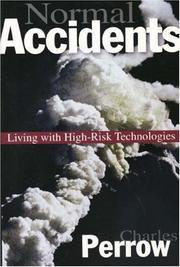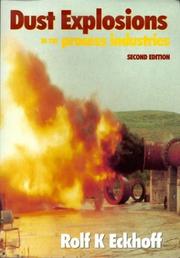| Listing 1 - 10 of 26 | << page >> |
Sort by
|
Book
ISBN: 926417995X 9264201181 Year: 2013 Publisher: [Place of publication not identified] : OECD,
Abstract | Keywords | Export | Availability | Bookmark
 Loading...
Loading...Choose an application
- Reference Manager
- EndNote
- RefWorks (Direct export to RefWorks)
Finance --- Business & Economics --- Insurance --- Industrial accidents --- Accidents, Industrial --- Accidents, Occupational --- Employees --- Industrial disasters --- Industrial injuries --- Occupational accidents --- Occupational injuries --- Accidents --- Disasters --- Disability evaluation --- Actuarial statistics --- Insurance statistics
Book
ISBN: 044463892X 0444638830 9780444638922 9780444638830 Year: 2018 Publisher: Amsterdam, Netherlands : Elsevier,
Abstract | Keywords | Export | Availability | Bookmark
 Loading...
Loading...Choose an application
- Reference Manager
- EndNote
- RefWorks (Direct export to RefWorks)
Industrial accidents. --- Industrial accidents --- Mathematical models. --- Accidents, Industrial --- Accidents, Occupational --- Employees --- Industrial disasters --- Industrial injuries --- Occupational accidents --- Occupational injuries --- Accidents --- Disasters --- Disability evaluation
Book
ISBN: 1299137741 2817803698 Year: 2013 Publisher: Paris : Springer,
Abstract | Keywords | Export | Availability | Bookmark
 Loading...
Loading...Choose an application
- Reference Manager
- EndNote
- RefWorks (Direct export to RefWorks)
Cet ouvrage fait suite à La Conduite des systèmes à risques publié par l'auteur en 1996 (réédition 2001). Le premier livre mettait l'accent sur la sécurité au niveau des individus, celui-ci met l'accent sur la gouvernance de la sécurité dans les industries et services. La sécurité des systèmes complexes n'a pas perdu son actualité, bien au contraire ; citons la vingtaine de catastrophes aériennes annuelles, les presque aussi fréquentes catastrophes de la chimie, le spectre des accidents nucléaires, sans oublier les problèmes atteignant les services publics en médecine ou dans la finance.La lis
Safety education. --- Industrial accidents. --- Accidents, Industrial --- Accidents, Occupational --- Employees --- Industrial disasters --- Industrial injuries --- Occupational accidents --- Occupational injuries --- Accidents --- Disasters --- Disability evaluation --- Safety training programs --- Prevention --- Study and teaching
Book
ISBN: 1108657737 1108663672 1108591566 1108488706 Year: 2020 Publisher: Cambridge : Cambridge University Press,
Abstract | Keywords | Export | Availability | Bookmark
 Loading...
Loading...Choose an application
- Reference Manager
- EndNote
- RefWorks (Direct export to RefWorks)
The late nineteenth- and early twentieth-century US economy maimed and killed employees at an astronomically high rate, while the legal system left the injured and their loved ones with little recourse. In the 1910s, US states enacted workers' compensation laws, which required employers to pay a portion of the financial costs of workplace injuries. Nate Holdren uses a range of archival materials, interdisciplinary theoretical perspectives, and compelling narration to criticize the shortcomings of these laws. While compensation laws were a limited improvement for employees in economic terms, Holdren argues that these laws created new forms of inequality, causing people with disabilities to lose their jobs, while also resulting in new forms of inhumanity. Ultimately, this study raises questions about law and class and about when and whether our economy and our legal system produce justice or injustice.
Workers' compensation --- Workmen's compensation --- Employers' liability --- Social security --- Law and legislation --- Social aspects --- History --- Industrial accidents --- Accidents, Industrial --- Accidents, Occupational --- Employees --- Industrial disasters --- Industrial injuries --- Occupational accidents --- Occupational injuries --- Accidents --- Disasters --- Disability evaluation

ISBN: 9783211715550 321171555X 9786611118280 1281118281 3211715568 Year: 2007 Publisher: [Wien ; New York] : SpringerWienNewYork,
Abstract | Keywords | Export | Availability | Bookmark
 Loading...
Loading...Choose an application
- Reference Manager
- EndNote
- RefWorks (Direct export to RefWorks)
Inspired by developments mirroring shifts in the legal basis for compensating damage from civil law to public funding and vice versa, this book examines the developments in compensation systems for damage arising from work-related injuries and diseases. The shifts which have occurred in this area in Germany, England, Belgium and the Netherlands are the subject of this volume. The shifts in the legal doctrine, legislation and the case law of these countries will first be mapped from a historical and comparative perspective, with the aim of discovering the precise nature of the given shifts. Sub
Industrial accidents --- Occupational diseases --- Workers' compensation --- 06.01.ZZD --- Workmen's compensation --- Employers' liability --- Social security --- Diseases of occupations --- Employees --- Industrial diseases --- Occupation diseases --- Occupations --- Work-related diseases --- Diseases --- Medicine, Industrial --- Accidents, Industrial --- Accidents, Occupational --- Industrial disasters --- Industrial injuries --- Occupational accidents --- Occupational injuries --- Accidents --- Disasters --- Disability evaluation --- Law and legislation --- Arbeidsongevallen ; Beroepsziekten ; Meerdere landen
Book
ISBN: 3845204249 3832928510 Year: 2007 Publisher: Nomos Verlagsgesellschaft mbH & Co. KG
Abstract | Keywords | Export | Availability | Bookmark
 Loading...
Loading...Choose an application
- Reference Manager
- EndNote
- RefWorks (Direct export to RefWorks)
Entsendungen und dauerhafte Auslandsbeschäftigung sind inzwischen ein weltweites Phänomen. Grenzüberschreitende Freizügigkeit bedarf aber der Begleitung durch grenzüberschreitende soziale Sicherung. Dies gilt auch für das Risiko von Arbeitsunfall und Berufskrankheit. Eine fehlende Koordinierung der nationalen Sozialrechtsordnungen und des Internationalen Privatrechts birgt hier die Gefahr von Schutzlücken für den Arbeitnehmer und von ungeklärten deliktischen Haftungsrisiken seines Arbeitgebers. Am Beispiel der internationalen Ausrichtung der deutschen gesetzlichen Unfallversicherung und der australischen Workers Compensation untersucht die Autorin diese Risiken umfassend. Mit einem detaillierten Raster praxisnaher Fallbeispiele ermittelt sie Defizite bei Versicherungsschutz, Leistungsrecht und Arbeitgeberhaftung und zeigt konkrete Lösungsmöglichkeiten auf. Bestehende völkerrechtliche Abkommen und das koordinierende Sozialrecht der EG sind als Musterregelungen in die Untersuchung einbezogen.
Workers' compensation --- Employers' liability --- Industrial accidents --- Accidents, Industrial --- Accidents, Occupational --- Employees --- Industrial disasters --- Industrial injuries --- Occupational accidents --- Occupational injuries --- Accidents --- Disasters --- Disability evaluation --- Injuries (Law) --- Liability, Employers' --- Tort liability of employers --- Liability (Law) --- Master and servant --- Strict liability --- Personal injuries --- Workmen's compensation --- Social security --- Law and legislation --- Rechtsvergleichung --- Internationales Recht --- Arbeits- und Sozialrecht
Book
ISBN: 110860062X 1108657850 1108631037 1108426506 1108443478 Year: 2018 Publisher: Cambridge : Cambridge University Press,
Abstract | Keywords | Export | Availability | Bookmark
 Loading...
Loading...Choose an application
- Reference Manager
- EndNote
- RefWorks (Direct export to RefWorks)
During the late nineteenth century, many countries across Europe adopted national legislation that required employers to compensate workers injured or killed in accidents at work. These laws suggested that the risk of accidents was inherent to work and not due to individual negligence. By focusing on Britain, Germany, and Italy during this time, Julia Moses demonstrates how these laws reflected a major transformation in thinking about the nature of individual responsibility and social risk. The First Modern Risk illuminates the implications of this conceptual revolution for the role of the state in managing problems of everyday life, transforming understandings about both the obligations and rights of individuals. Drawing on a wide array of disciplines including law, history, and politics, Moses offers a fascinating transnational view of a pivotal moment in the evolution of the welfare state.
Industrial accidents --- Workers' compensation --- Welfare state --- Risk-taking (Psychology) --- Risk behavior --- Risky behavior --- Taking risks --- Human behavior --- State, Welfare --- Economic policy --- Public welfare --- Social policy --- State, The --- Welfare economics --- Workmen's compensation --- Employers' liability --- Social security --- Accidents, Industrial --- Accidents, Occupational --- Employees --- Industrial disasters --- Industrial injuries --- Occupational accidents --- Occupational injuries --- Accidents --- Disasters --- Disability evaluation --- History
Book
ISBN: 282590015X 9782825900154 Year: 1977 Volume: 6 Publisher: Paris
Abstract | Keywords | Export | Availability | Bookmark
 Loading...
Loading...Choose an application
- Reference Manager
- EndNote
- RefWorks (Direct export to RefWorks)
Workers' compensation --- Industrial accidents --- Law and legislation --- 351.84*5 <44> --- -06.01.B --- Workmen's compensation --- Employers' liability --- Arbeidsongevallen. Beroepsziekten--Frankrijk --- -Arbeidsongevallen ; Beroepsziekten ; België --- 351.84*5 <44> Arbeidsongevallen. Beroepsziekten--Frankrijk --- 06.01.B --- Accidents, Industrial --- Accidents, Occupational --- Employees --- Industrial disasters --- Industrial injuries --- Occupational accidents --- Occupational injuries --- Accidents --- Disasters --- Disability evaluation --- Social security --- Arbeidsongevallen ; Beroepsziekten ; België --- Social medicine --- Social law. Labour law --- Workers' compensation - Law and legislation - Belgium --- Industrial accidents - Belgium --- Luther, Martin --- Luther, Martin (1483-1546) --- Biographie --- Critique et interprétation

ISBN: 9780691004129 0691004129 Year: 1999 Publisher: Princeton : Princeton university press,
Abstract | Keywords | Export | Availability | Bookmark
 Loading...
Loading...Choose an application
- Reference Manager
- EndNote
- RefWorks (Direct export to RefWorks)
614.82 --- Accidents --- Industrial accidents --- Technology --- -363.1 --- Applied science --- Arts, Useful --- Science, Applied --- Useful arts --- Science --- Industrial arts --- Material culture --- Accidents, Industrial --- Accidents, Occupational --- Employees --- Industrial disasters --- Industrial injuries --- Occupational accidents --- Occupational injuries --- Disasters --- Disability evaluation --- Common accidents --- Injuries --- Diseases --- First aid in illness and injury --- Violent deaths --- Emergencies --- Hazards from various mechanical and physical causes --- Risk assessment --- Causes and theories of causation --- 614.82 Hazards from various mechanical and physical causes --- Accidents. --- Industrial accidents. --- Risk assessment. --- Monograph

ISBN: 0750632704 Year: 1997 Publisher: Oxford : Butterworth-Heinemann,
Abstract | Keywords | Export | Availability | Bookmark
 Loading...
Loading...Choose an application
- Reference Manager
- EndNote
- RefWorks (Direct export to RefWorks)
614.83 --- Dust explosions --- Fire prevention --- Industrial accidents --- Accidents, Industrial --- Accidents, Occupational --- Employees --- Industrial disasters --- Industrial injuries --- Occupational accidents --- Occupational injuries --- Buildings --- Fire safety --- Fires --- Prevention of fires --- Dust explosion --- 614.83 Explosion hazards --- Explosion hazards --- Accidents --- Fires and fire prevention --- Prevention --- Dust explosions. --- Fire prevention. --- Industrial accidents. --- Coups de poussières. --- Incendies --- Travail --- Prévention. --- Accidents. --- Disasters --- Disability evaluation --- Fire protection engineering --- Public safety --- Insurance engineering --- Explosions --- Coups de poussières. --- Prévention.
| Listing 1 - 10 of 26 | << page >> |
Sort by
|

 Search
Search Feedback
Feedback About UniCat
About UniCat  Help
Help News
News